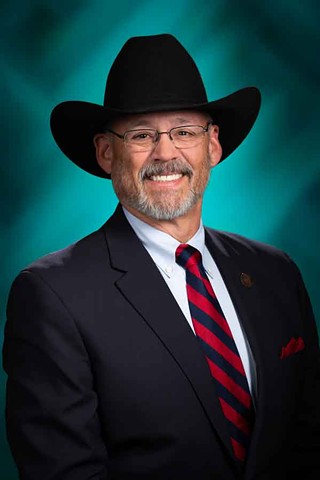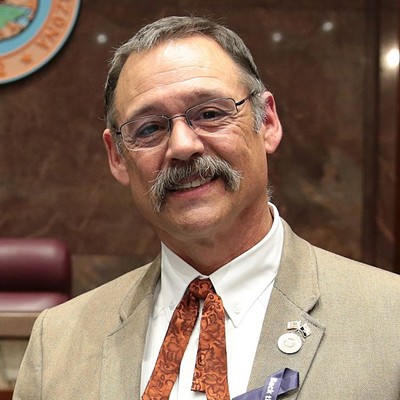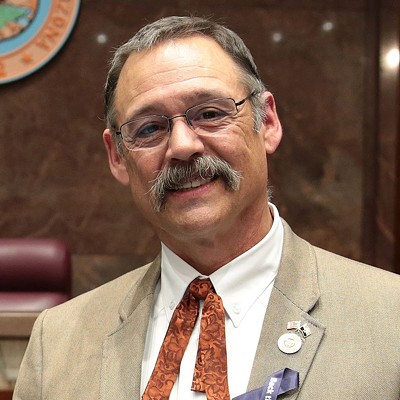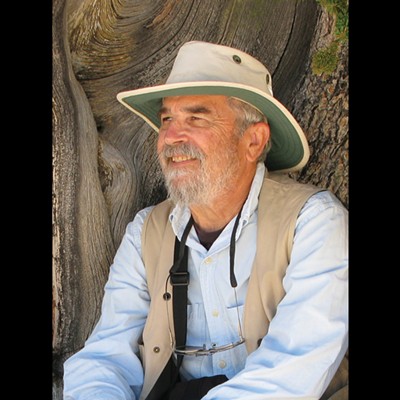Oro Valley is probably not the first place you would envision a threat to Arizona democracy rising quickly from the desert sand. Alas, a threat is out there slowly rattling his tail. As I recently detailed for the Weekly (“Ballot Box BS,” Oct. 28), it is from there that Arizona State Rep. Mark Finchem is becoming a rising player in Trumpian efforts to subvert the rightful results of the 2020 election. Unfortunately for his constituents and the entire state, this is just one act in a laundry list of bad decisions Finchem has made in his time in Arizona politics. So, given his announcement of a run for Secretary of State as one four current GOP candidates, it is critical to take a look back at the history and résumé of Trump’s preferred pick for one Arizona’s highest ranking politicians. (Finchem declined to be interviewed for this article, saying he was traveling and unavailable for a phone call.)
Before digging deep into Finchem’s political past, let us briefly get to know him. According to his own campaign page, Finchem was born in Detroit and served over 20 years in the Kalamazoo Department of Public Safety—in roles from enforcement to firefighting. Upon his retirement, he moved to Tucson and worked in software and real estate. Then in 2019, he earned a Bachelor of Arts in Government with an emphasis in State and Local Public Policy from Grand Canyon University. However, his political career (and interest in politics) had begun years prior when he won the 2014 General Election to serve as a State Representative for Arizona’s District 11—which currently spans from Oro Valley to the Town of Maricopa. Through that political career, it seems that GCU’s curriculum and the classes he currently takes in his Master of Legal Studies program at the University of Arizona (where he has previously lied about being a “Legislative Fellow in Residence”) have failed to teach him much about the law, the truth or good governance. So while the effort at recalling him from his seat as a state representative failed this past summer, Finchem cannot be allowed to take charge of elections in our state.
To understand why, let us delve into Finchem’s behavior, legislative history, and conspiracy consumption.
Conspiracies, Militias, the Far-Right and Finchem
Finchem is no stranger to conspiracies and the far-right. In fact, before heading to the Arizona Legislature, he had already joined the Oath Keepers—who played a leading role in the Jan. 6 insurrection. According to the Center for Strategic and International Studies, the militia group is “founded on the belief that the federal government is part of an evil conspiracy intent on stripping Americans of their natural rights and freedoms.” Its members have encouraged violence in opposition. The founder of Oath Keepers has previously encouraged the murder of elected officials, including in 2015 openly calling for the late Sen. John McCain to be put to death by hanging.
And Finchem’s concerning far-right, conspiracy-laden ties only grow from there.
He previously served as the Arizona coordinator for the Coalition of Western States—a group of legislators and activists who supported the armed occupation of Oregon’s Malheur National Wildlife Refuge in 2016. He also signed a letter of support to pardon arsonists who burned federal government land. It was their initial arrest that eventually led to tensions at Malheur.
Following the horrific events of the 2017 Charlottesville “Unite the Right” rally, Finchem denied any far-right involvement in the event—claiming that mainstream media was lying and that it was a Deep State PSYOP to construct a political narrative for Democrats. It was not. He also falsely accused contemporary Democrats as being the true members of the Ku Klux Klan who joined the rally. Not only have members of the alt-right pleaded guilty as to their role in the event, but it was also promoted by a plethora of far-right figures from Azzmador to the founder of The Daily Stormer. It is almost unfathomable to have to say this, but “Unite the Right” rally was in fact a political event of the political right.
No, Rep. Finchem, calls for a race war in Charlottesville were not a coordinated liberal operation—but rather the actions of your own political allies.
Mark Finchem also parrots far-right conspiracies on vaccines. Sure, Finchem got COVID-19 himself. And yes, his mother lost her decades long battle with cancer soon after contracting the virus. But on his official Twitter in July, he warned President Joe Biden to take his “tweet as Arizona’s statewide ‘no trespassing sign.’ You and your vaccine henchmen have been forewarned.” I am unsure what exactly he is threatening here, but I believe you can read between the lines.
Finchem’s supply of money also comes from the right-wing extremists. One of his leading campaign funders is Daniel Brophy, a Wyoming-based political megadonor and brother of former State Sen. Kate Brophy McGee of Phoenix. According to a local legal group, Sen. McGee herself once described her brother as having alt-right political views after he gave money to her political rival. When a woman who has proudly touted her anti-LGBTQ+ bonafides and was painted as a bygone example of the Arizona GOP by English newspaper The Guardian calls you alt-right, I am going to have to take her word for it.
Rep. Finchem also attended the premiere of a “documentary” called The Deep Rig about an alleged conspiracy in the 2020 election. The film featured Cyber Ninjas CEO Doug Logan (who confirmed himself as “Anon” in the movie), former Secretary of State Ken Bennett, and other leaders of election conspiracies in Arizona. Finchem supported the film despite the fact that its director has a history of baseless conspiracies—including the dedication of an entire film to the argument that extraterrestrials were the cause of the Sep. 11 attacks on the Twin Towers. Just to be clear, they were not.
I do not want my possible Secretary of State being tied to any of this. And I am venturing a guess that you do not believe in alien terrorist theories either. Not to mention that supporting The Deep Rig alone is concerning for anyone attempting to run elections in Arizona. Yet, it gets worse still.
Trump’s re-election committee paid thousands of dollars to a business owned by Rep. Finchem as he launched efforts to overturn Arizona’s election results. Now, Finchem spends his time parroting election fraud claims on QAnon, far-right radio shows. AZ Mirror reported in April that Finchem had scheduled an appearance on “RedPill78,” a conspiracy channel on YouTube whose host—Zak Paine—has been repeatedly removed from the platform. He also appeared in a video with Dr. Shiva Ayyadurai—going as far as promoting it on his official campaign page. Dr. Shiva, while called as an expert witness before the State Senate, has repeatedly failed to understand state election procedures, been paid by partisan activists to make fraud claims, voiced anti-vaccine perspectives at schools, and dubiously claimed to have invented email. (He likely did not.)
In September, Finchem continued his anti-democratic campaign as he tried to request “all hard drive images of tabulation machines used in the 2020 General Election” (amidst multiple following grammar errors) from the Pima County government. As I type this, the home page of Finchem’s campaign website still claims that votes were reallocated in real time on national television during Nov. 3, 2020. That’s false. That’s a delusion. That did not happen.
Given his evident belief in the conspiracies of the far-right, of course Finchem was at the insurrection on Jan. 6 himself. Despite claiming that he never made it closer than 500 yards to the Capitol building, footage of the event clearly shows the politician in attendance himself. He also tweeted in praise of the insurrectionists. Plus, the prominent “Stop the Steal” organizer Ali Alexander identified Finchem as the starting point of the anti-democratic movement in Arizona.
Not only was he there, but he then spread more conspiracies after the fact. In his newsletter following the attack in D.C., he claimed (falsely) that facial recognition technology had identified masses of leftist activists in the crowd. He also accused Antifa of responsibility for violence at the Capitol building, despite having no evidence for such claims. Further, even in the face of proof of him attending the event, he has repeatedly threatened to sue anybody attempting to connect him to the events at the Capitol.
Given all of this, it is no surprise that Finchem was endorsed by Trump. In mid-September, the former President released a statement calling the state representative a “true warrior” with the courage to say what others will not. If that’s baseless conspiracy theories, it seems Trump is at least right about one thing. Finchem is now taking these baseless conspiracies on the road to stump for the former President too.
Concerning Political Priorities & Legislative History
However, even looking back at Finchem’s legislative actions and priorities should give Arizona voters reasons for pause. Let us look back at some of Finchem’s “greatest” legislative hits.
In late 2018, Finchem introduced HB 2002 to create an educator code of ethics. At first, a code of ethics does not sound so bad. That is likely to change once you learn that Finchem’s recommendations were a near word-for-word copy of those proposed by the “Stop K-12 Indoctrination” campaign of the David Horowitz Freedom Center—an openly far-right, anti-Muslim organization. They intended to silence any form of political statements by teachers. The campaign included fights against racial justice and equity trainings, and curriculum teaching students about the religion of Islam. Because nothing says anti-indoctrination like mandatory ethics pledges.
In support of the bill, Finchem continued to display a tenuous relationship with the truth. While he claimed tons of parents angrily contacted him about the issue, it turns out that simply was not the case. Instead, many considered the proposal of the bill to be retribution for the #RedForEd movement.
Finchem also introduced a bill in the 2016 legislative session that would give Arizona’s government the power to ignore executive orders, federal actions and Supreme Court rulings that Congress found to be unconstitutional. Finchem argued that Supreme Court rulings should not be called rulings—according to him, the decisions are not even worthy of being called case law. (I wonder if his University of Ariona professors in the law school would agree?) “The court can pass an opinion all day long,” he told Capital Media Services reporter Howard Fischer. “But until that opinion goes back to Congress and becomes an enactment, and is signed into law, a statute, by the president, it’s not operable.” The legality of circumventing the decisions of two of the three branches of federal government is suspect at best, and I mean at best.
Finchem also has a tortured history of land ownership arguments. Not only has he argued lower-case ‘r’ republican government cannot exist if a state owns less than 51% of its land (I am unsure if he understands the definition of republican government), he supported legislation that would force private property owners to receive approval from the state before selling their lands to the federal government. Rep. Finchem was also responsible for a bill which would direct Arizona’s attorney general to join a lawsuit to wrestle away control of federal lands to ‘fund education.’ This was despite significant criticism from organizations including the Arizona Wildlife Federation that the state could not afford to take ownership of the land. Not to mention that Arizona voters had also rejected a proposition seeking to do exactly this in 2012—so much for listening to the people, I guess.
The concerning political history manages to continue on further yet. In committee, Finchem voted no on a bill (2018’s SB1431) to create a memorial for Arizona veterans who committed suicide due to post traumatic stress disorder or traumatic brain injury. It passed the Senate unanimously, and even the House after that. Finchem has also suggested President Obama facilitated jihad, claimed Senate Majority Leader Mitch McConnell to be an enemy of the Constitution for discussing gun issues following the Orlando nightclub shooting, and suggested Obama should move to a different country.
I am running out of words to spend on this topic, but it is not like Finchem’s stint in the Arizona Legislature has been a harmonious or productive one. And whether or not you agree with Finchem’s political affiliation, you must admit that his conspiracies and legislative history do not demonstrate his readiness for the next level of state politics.
A Danger as Secretary of State
Which then brings us to the main point of this article: the man who has done all of this is running for one of the highest offices in our state. The Arizona Secretary of State is tasked with a lot. According to the official government page about the office, this includes “serving as acting governor when the governor is absent from the state,” sitting “first in line to succeed the governor,” and to serve as the “Chief Election Officer for the State.”
I cannot overstate the importance of every single one of those tasks.
Finchem’s campaign website claims he has the “integrity we can trust.” I vehemently disagree. And I hope you do too, especially come election time. Someone like Mark Finchem should not have this much power in our state. Someone who attacks teachers and votes against Arizona veterans. Someone who does not respect Supreme Court decisions. Someone pushing conspiracies and celebrating literal insurrection.
Finchem’s campaign website also tells us that “With so much at stake, we need leaders who serve a higher authority and who don’t seek personal gain or political advancement.” Which is, after reading all of this, exactly why we cannot elect Mark Finchem. There are three other Republicans and two Democrats in the race so far, and they all have to be less damaging for our beautiful state.















